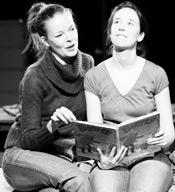|
|
 |
| |
Factory Girls’ struggle needs a bit more focus
Factory girls
Arcola Theatre
Dalston’s highly acclaimed Arcola Theatre celebrates its fifth anniversary with a production of Frank McGuiness’s Factory Girls, the tale of five women working at a failing shirt factory in Donegal, Ireland.
Set during 1982, a year of recession, the women face a struggle against management to preserve their wages and acceptable working conditions.
Faced with possible redundancies, the women barricade themselves in the factory manager’s office.
Factory Girls makes excellent use of the Arcola’s past as a clothing factory. The first act is set on the factory floor, the audience strewn around three sides of the actors, sitting on chairs and boxes. This provides a real sense of immersion and atmosphere, which is added to by a charismatic cast of women who throw around McGuiness’s banter with real wit and vivacity, with Maggie McCarthy particularly effective as the pugnacious Ellen.
However, despite the originality of the set and the charm of the actors, Factory Girls suffers from a lack of focus, which becomes particularly problematic in the second act, when the action moves to a more conventional office setting.
The nature of the women’s struggle against management is vague, as is the role of Paul Lloyd’s occasionally sinister union man.
If McGuiness meant to write a play exploring the lives of the women using the dispute as a backdrop, then he has failed to give his characters any great depth.
If the play means to examine what it meant to be a part of the 1980s failing textile industry, then it lacks sufficient exploration of this also.
That Factory Girls offers no resolution to the women’s struggle would not be a problem but for the fact that their struggle is ill defined in the first place.
Until 18 February
020 7503 1646 |
|
 |
|

